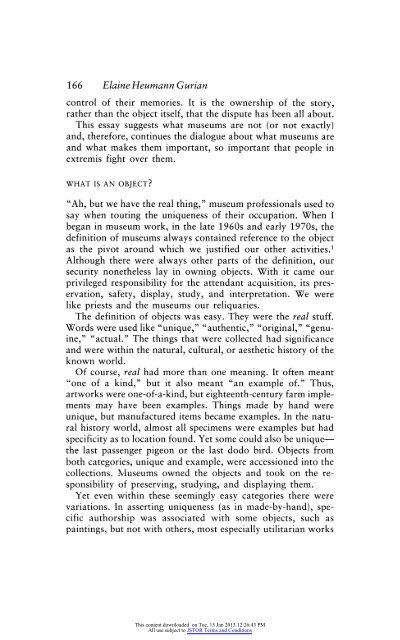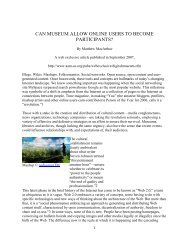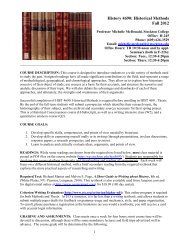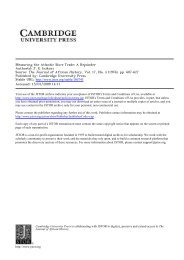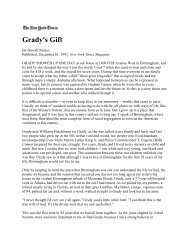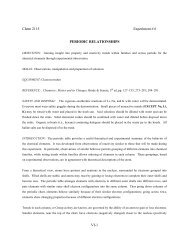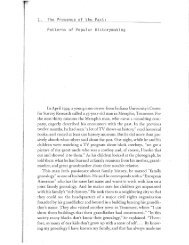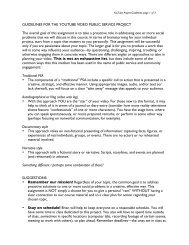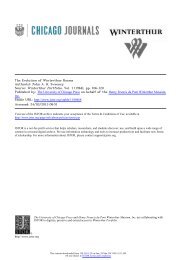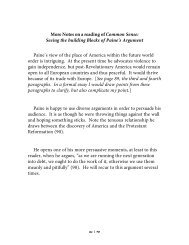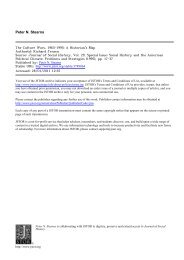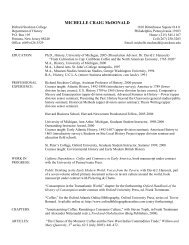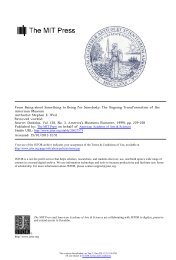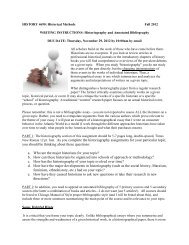What Is the Object of This Exercise? A Meandering Exploration of ...
What Is the Object of This Exercise? A Meandering Exploration of ...
What Is the Object of This Exercise? A Meandering Exploration of ...
You also want an ePaper? Increase the reach of your titles
YUMPU automatically turns print PDFs into web optimized ePapers that Google loves.
166 Elaine Heumann Gurian<br />
control <strong>of</strong> <strong>the</strong>ir memories. It is <strong>the</strong> ownership <strong>of</strong> <strong>the</strong> story,<br />
ra<strong>the</strong>r than <strong>the</strong> object itself, that <strong>the</strong> dispute has been all about.<br />
<strong>This</strong> essay suggests what museums are not (or not<br />
exactly)<br />
and, <strong>the</strong>refore, continues <strong>the</strong> dialogue about what museums are<br />
and what makes <strong>the</strong>m important,<br />
so<br />
important that people in<br />
extremis fight<br />
over <strong>the</strong>m.<br />
WHAT IS AN OBJECT?<br />
"Ah, but we have <strong>the</strong> real thing," museum<br />
pr<strong>of</strong>essionals used to<br />
say when touting <strong>the</strong> uniqueness <strong>of</strong> <strong>the</strong>ir occupation. When I<br />
began<br />
in museum<br />
work, in <strong>the</strong> late 1960s and early 1970s, <strong>the</strong><br />
definition <strong>of</strong> museums<br />
always contained reference to <strong>the</strong> object<br />
as <strong>the</strong> pivot around which we<br />
justified<br />
our o<strong>the</strong>r activities.1<br />
Although <strong>the</strong>re were<br />
always o<strong>the</strong>r parts <strong>of</strong> <strong>the</strong> definition, our<br />
security none<strong>the</strong>less lay in owning objects. With it came our<br />
privileged responsibility for <strong>the</strong> attendant acquisition, its pres<br />
ervation, safety, display, study, and interpretation. We were<br />
like priests and <strong>the</strong> museums our<br />
reliquaries.<br />
The definition <strong>of</strong> objects<br />
was easy. They<br />
were <strong>the</strong> real stuff.<br />
Words were used like "unique," "au<strong>the</strong>ntic," "original," "genu<br />
ine," "actual." The things that were collected had significance<br />
and were within <strong>the</strong> natural, cultural,<br />
or aes<strong>the</strong>tic history <strong>of</strong> <strong>the</strong><br />
known world.<br />
Of course, real had more than one meaning. It <strong>of</strong>ten meant<br />
"one <strong>of</strong> a kind," but it also meant "an<br />
example <strong>of</strong>." Thus,<br />
artworks were one-<strong>of</strong>-a-kind, but eighteenth-century farm imple<br />
ments may have been examples. Things made by hand were<br />
unique, but manufactured items became examples.<br />
In <strong>the</strong> natu<br />
ral history world, almost all specimens<br />
were<br />
examples but had<br />
specificity<br />
as to location found. Yet some could also be unique?<br />
<strong>the</strong> last passenger pigeon or <strong>the</strong> last dodo bird. <strong>Object</strong>s from<br />
both categories, unique and example,<br />
were accessioned into <strong>the</strong><br />
collections. Museums owned <strong>the</strong> objects and took on <strong>the</strong> re<br />
sponsibility <strong>of</strong> preserving, studying, and displaying <strong>the</strong>m.<br />
Yet even within <strong>the</strong>se seemingly easy categories <strong>the</strong>re were<br />
variations. In<br />
asserting uniqueness (as in made-by-hand), spe<br />
cific authorship<br />
was associated with some<br />
objects, such as<br />
paintings, but not with o<strong>the</strong>rs, most<br />
especially utilitarian works<br />
<strong>This</strong> content downloaded on Tue, 15 Jan 2013 12:26:43 PM<br />
All use subject to JSTOR Terms and Conditions


